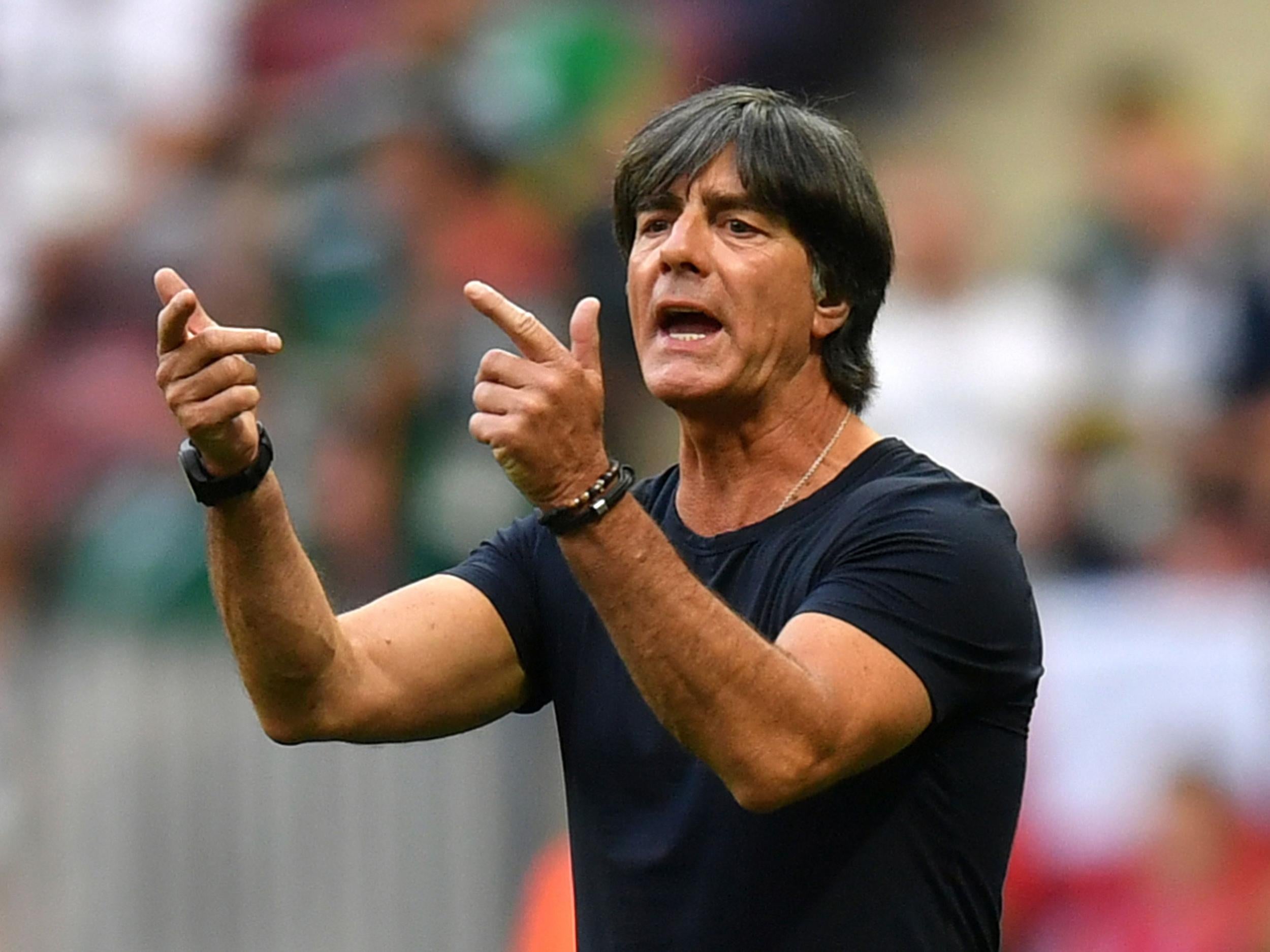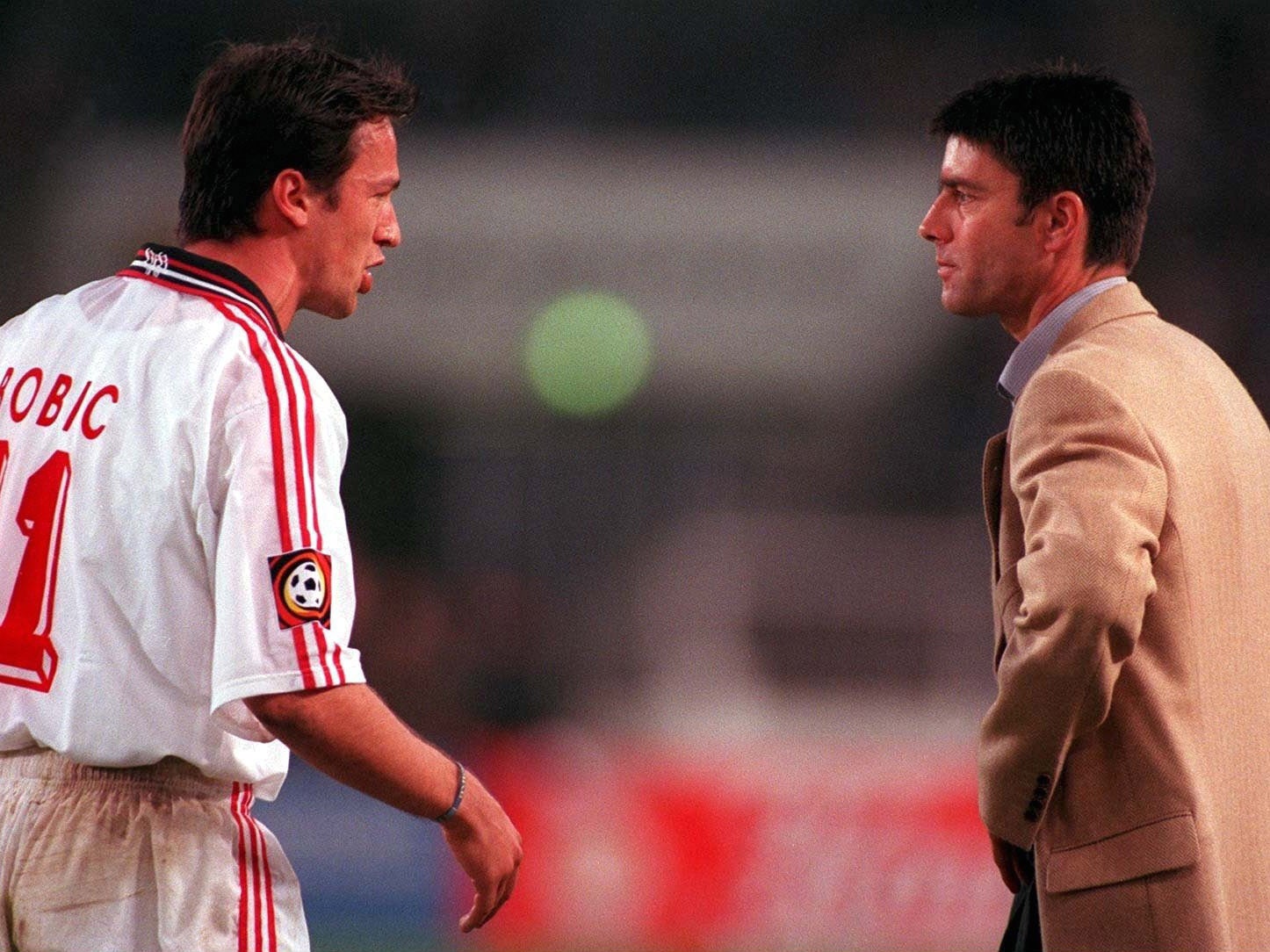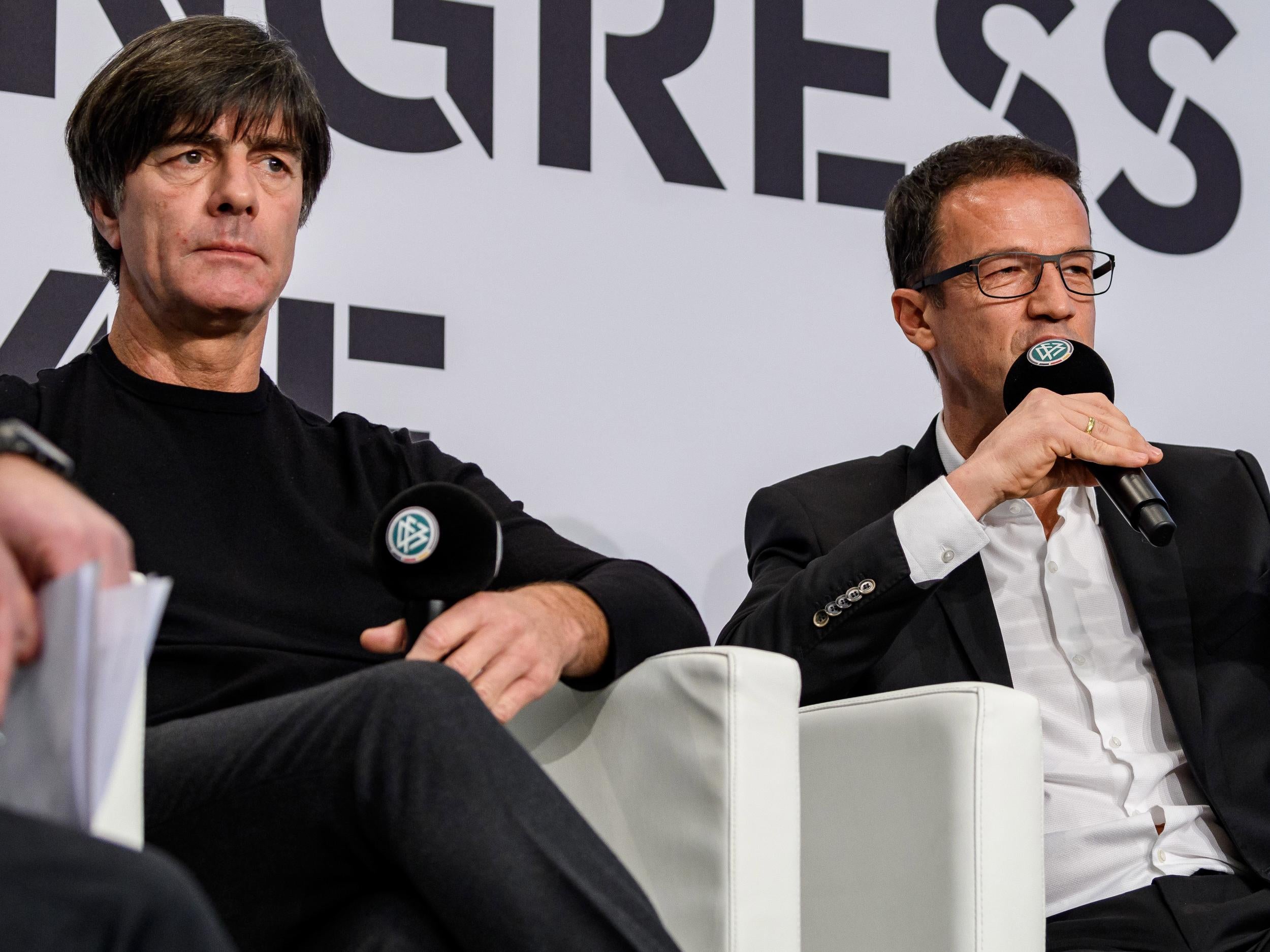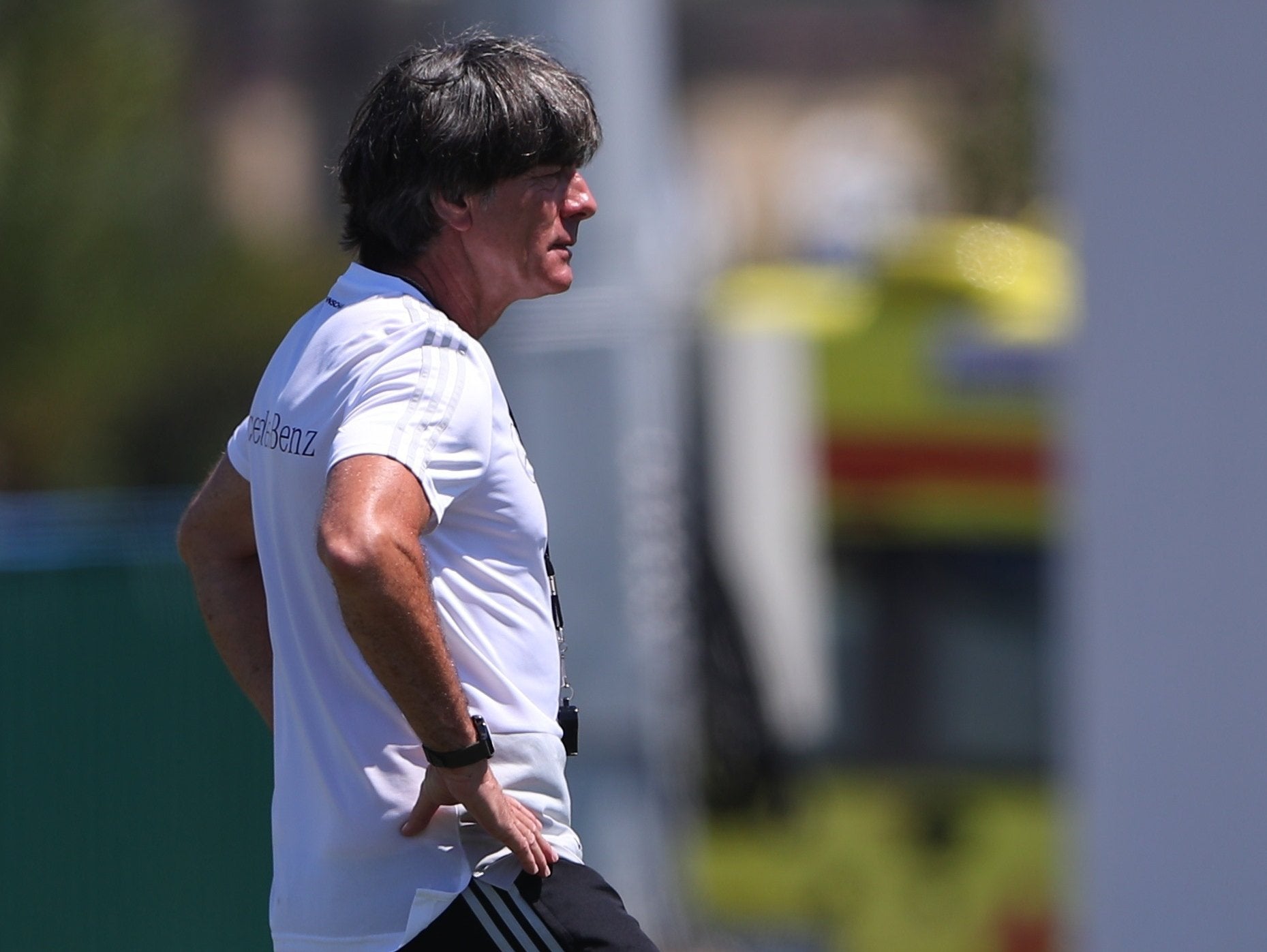World Cup 2018: Joachim Low is as important as Angela Merkel - and he can still save Germany
Speaking exclusively to The Independent Fredi Bobic explains why Germany's manager has what it takes to turn this World Cup around

Your support helps us to tell the story
From reproductive rights to climate change to Big Tech, The Independent is on the ground when the story is developing. Whether it's investigating the financials of Elon Musk's pro-Trump PAC or producing our latest documentary, 'The A Word', which shines a light on the American women fighting for reproductive rights, we know how important it is to parse out the facts from the messaging.
At such a critical moment in US history, we need reporters on the ground. Your donation allows us to keep sending journalists to speak to both sides of the story.
The Independent is trusted by Americans across the entire political spectrum. And unlike many other quality news outlets, we choose not to lock Americans out of our reporting and analysis with paywalls. We believe quality journalism should be available to everyone, paid for by those who can afford it.
Your support makes all the difference.“He’s become a real personality,” says Fredi Bobic when talking about his friend and former coach Joachim Low. The Eintracht Frankfurt sporting director then titters: “People say to me at that level, he’s as important as Angela Merkel.”
This is in April, two months before Löw faced what is being viewed back home as a crisis this week. After the 1-0 defeat to Mexico, Löw tried to calm the situation.
“Wir werden das schaffen” were his words in German – "we will manage", echoing not just the comments of Bobic but also Angela Merkel.
“Wir schaffen das” (we’ll manage) was her response whenever she was asked during the 2015 refugee crisis about her plan for the situation. Given that they occasionally dine together, perhaps something rubbed off.
The comparison between the two has been perpetuated both formally in the media and slightly less so with a meme doing the rounds in which Löw’s head has been superimposed onto Merkel’s with “Wir schaffen das” scrawled below.
Löw has reached at least the semi-finals of every major tournament he’s been in with Germany. The high expectations that has created makes a potential group stage exit seem like a crisis for the world champions. That he even became that in 2014 is quite impressive given where and how he began.
It gets Fredi Bobic chuckling again. “I certainly didn’t think that he’d achieve what he has but I believe he didn’t think that either. Not at all!”
“His first big job” was taking over at Stuttgart in the Bundesliga in August 1996 – quite a step for somebody who just over a year before had been player-coach of FC Frauenfeld, a non-league side in Switzerland.
To see what brought him there, you need to start with his playing career which didn’t end in Germany.
Roland Zorn of the well-respected FAZ has covered all but one World Cup for the German newspaper since the 1982 tournament. It means that back home at the time, he saw for himself Löw’s ‘ordinary Bundesliga career’. Injuries didn’t help the forward but his 82 goals for second divisision Freiburg still make him the club’s top scorer to this day.

“His time abroad shaped him more than his time in Germany,” says Zorn but Löw didn’t have to travel far for that.
His picturesque hometown of Freiburg is nestled right in Germany’s most south westerly corner, with France and Switzerland not far. In 1989, he made the 60-mile move down the road to the latter, playing for Schaffhausen in the Swiss second division.
“It wasn’t like he was dreaming night and day about becoming a coach. It was a process,” says Axel Thoma, Löw’s team-mate and housemate in Schaffhausen.
The arrival of Rolf Fringer was key. According to German magazine 11Freunde, Löw once said that no other coach had taught him as much as Fringer, who sought to play attacking football, pressing the opposition. He was his captain and they were on good terms with each other, often going out to local bar and restaurant “Kastanienbaum” AKA the Chestnut Tree with Thoma.

When they weren’t playing football, Löw and the rest of the squad went to work. As part of what Thoma terms as a marketing gag, he and Löw once even sold colourful ties – the sort of which you probably wouldn’t find the present-day, cleaner cut Löw going near. There was more serious office work to be done as well with Löw working for one local company, writing delivery notices for goods coming into Hamburg harbour.
But Löw loved it in Switzerland, counting it still as one of the best times of his life. He and Thoma stayed in the country, moving to Winterthur in 1992 whilst Fringer headed off to win the Swiss Super League with Aara.
It was in Winterthur that Löw’s coaching career began, starting out in youth coaching with the club,. He took his Swiss coaching badges which made sense as Roland Zorn puts it. In terms of its coaching qualifications, “Switzerland was further ahead than Germany at the time.”
Löw moved to Frauenfeld in 1994 but left twelve months in when Fringer came calling. He wanted him to be his assistant coach in Stuttgart.

That’s where Löw first got to know Fredi Bobic who himself had just moved across town from Stuttgarter Kickers. Bobic would become a fearsome striker for the club but the good times only really came when Löw made the step up in 1996. Stuttgart had finished in mid-table the season before and Fringer went to take the Switzerland job.
“Back then we have done something which at that point was unusual, in that few teams played pressing football,” says Bobic, making the point that Löw “loved attacking football” several times.
“You used to play offensive football with a ‘libero’ in the 90s. He played a structured style of attacking football with defensive players pushed up. He always wanted to exert pressure. That was already his signature style, already what he always wanted.”
Bobic continues: “He felt like a former footballer. He was young. When you finished playing not long before, then you’re naturally somebody that still has a very good connection to the boys. Of course, sometimes he took things personally but actually he was more: “I have to be objective.” Just like he is today. Very clear in his style.”
His close bond to the players could be seen outside Stuttgart city hall in June 1998. Having led Stuttgart to the DFB-Cup, Löw had his head shaved by the team as the city celebrated. Bobic, with his hair dyed red, could be seen joking next to Löw. He’d been the top scorer in the team but more importantly, a third of one of Germany’s most fabled striker partnerships with Krassimir Balakov and Giovane Elber, nicknamed the magic triangle.

They’d finished fourth in the Bundesliga too – their best finish since winning it in 1992 and they’d repeat that the following year. Under Löw, Stuttgart even reached the European Cup Winners Cup Final in 1997 but Gianfranco Zola ensured Chelsea won 1-0 in Stockholm.
His sacking in May was seen as harsh and was the beginning of a lean spell for Löw. That decision spoke more of unrest at boardroom level but he’d get used to that. When he went to Fenerbahce that year, he finished third but was let go at the end of the season.
He took over at second division Karlsruhe, Stuttgart’s arch-rivals. They were in mid-table, wanting promotion but when Löw left the club seven games before the end of the season, they were bottom.
In 2000, he was granted an exception after his time at Stuttgart to take the new German pro-coaching licence, despite not having all the necessary qualifications. There he met Jürgen Klinsmann which would come in handy four years later.

In between was what Bobic describes as a “very, very difficult time for him. He will never forget that.”
Löw seemed to always be fighting against something greater off the pitch. He went back to Turkey to coach first division side Adanaspor in 2001 but resigned after four games. He won the Austrian Bundesliga with FC Tirol in 2002 but they went bankrupt at the end of the season and he lost his job.
In an eight month spell at Austria Vienna, he was still sacked even with the team top of the league. Performance levels had dropped to the extent that after one defeat, the fans delayed the team’s departure from Klagenfurt by sitting in front of the bus.
Löw then was out of work again in March 2004 until later that year.
Roland Zorn remembers bumping into him on holiday in Fuerte Ventura that summer. There, over a couple of Weissbier, Löw told him the attacking style of play that he’d want to implement should he become a Bundesliga coach again.
That wouldn’t be the case though. He had instead a little bit of luck as Bobic puts it with new Germany coach Jürgen Klinsmann recruited Löw as his assistant.
“Then he could turn his ideas into reality with great players ultimately where he could play his attacking football.”
After the 2006 World Cup, he then stepped up to the top job. Zorn notes how that took time for German fans to get used to. They had been used to coaches who had been legends as players such as Berti Vogts, Rudi Völler or most famously, Franz Beckenbauer.
“Comebacks - that is something I like,” smiles Bobic. “That the German FA had the courage to do that because it doesn’t always work when an assistant coach becomes head coach. He really deserved that.”
Löw is coming up to 12 years in the Germany job and signed a new four year deal in May, running through to 2022. He needs another turnaround against Sweden in Sochi but either way after what he’s been through, he’ll manage.
Join our commenting forum
Join thought-provoking conversations, follow other Independent readers and see their replies
Comments